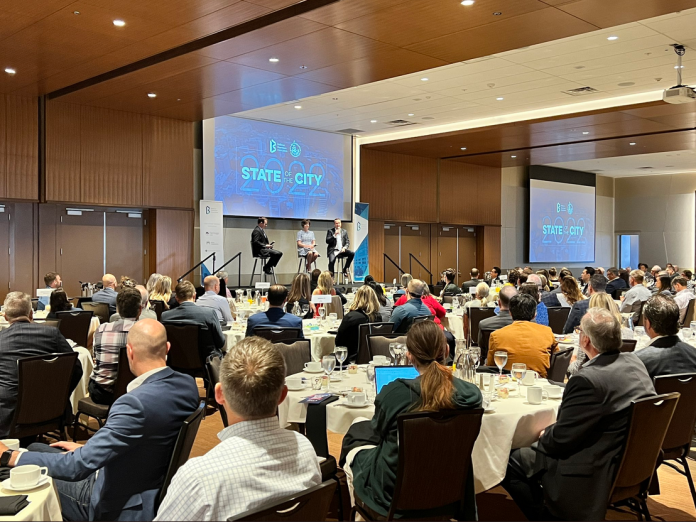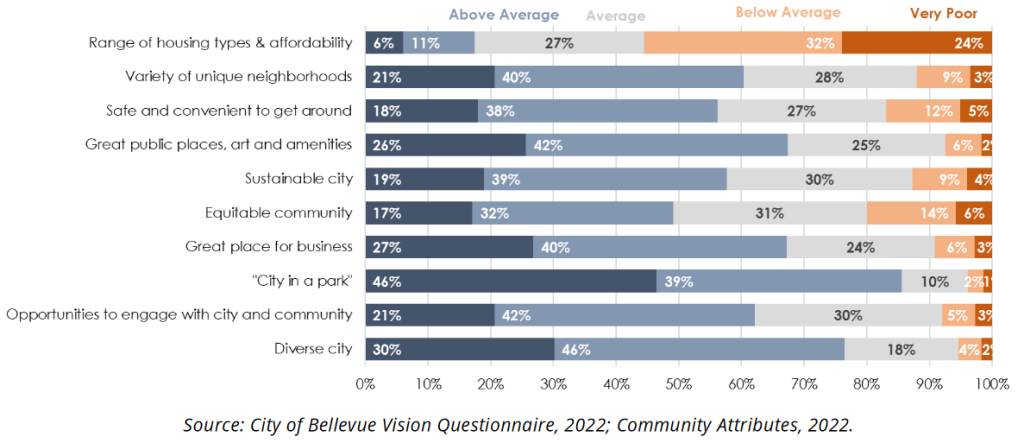
Early Tuesday morning, over 150 people packed into a fourth floor ballroom of Meydenbauer Center to attend Bellevue’s annual State of the City address — in-person for the first time in three years. The event, hosted by the Bellevue Downtown Association (BDA), was an opportunity for people to hear directly from Mayor Lynne Robinson and Deputy Mayor Jared Nieuwenhuis on a range of topics, from affordable housing to transportation and public safety.
Since tickets for non-BDA members were $60, the formal affair (complete with a full breakfast) was predominantly attended by businesses, city staff, developers, and other Bellevue bigwigs. With a theme of “Bellevue: Thriving by Design,” the conversational format gave the mayor and deputy mayor opportunity to opine on the city’s successes to the corporate-friendly crowd.
On the topic of budgets, Deputy Mayor Nieuwenhuis was quick to ease any potential concerns businesses had after reporting from Seattle Times’ Danny Westneat claimed that the city was considering a Seattle-style Amazon tax. “We are not, despite what you may have read in The Seattle Times, looking at an Amazon tax, a head tax, or a Jumpstart tax… That is not how you thrive by design.” Westneat’s reporting was based on comments from Councilmember Conrad Lee that The Urbanist reported on back in early March.
Although Lee noted at the time that “[Amazon has] to participate in the city’s growth in all ways — including its financial situation,” Bellevue City Council has not discussed implementation of a big business tax similar to Seattle’s. That city’s Jumpstart tax, a payroll tax levied against salaries exceeding $150,000 per year on companies with total annual payrolls of $7 million or higher, raised $277 million in its first year. These funds have mainly gone towards affordable housing projects, but they have also been used to support economic development and plug the Seattle’s reserve funds.
Although Bellevue does not have a similar dedicated revenue source for affordable housing (aside from general fund allocations), Mayor Robinson pointed to the recent success of the city’s Multi-Family Tax Exemption (MFTE) program. The program, which grants developers a 12-year property tax holiday if they dedicate 20% of their units to be affordable to people making 80% of area median income (AMI), underwent some revisions early last year meant to help increase its use. “That [program] has been so successful that every developer that can use it is using it.” This is based on a staff presentation from April, which shared that developers’ use of the new program far exceeded the city’s expectations.
However, Bellevue is still significantly under-producing affordable housing units compared to what’s needed. According to figures from 2016 (the most recent year that a Housing Needs Assessment was conducted), Bellevue has thousands fewer homes affordable to families making less than 50% AMI than needed. With companies like Amazon and Meta contributing to significant tech sector growth in the city, it’s likely this deficit has only increased. To accommodate this growth, Mayor Robinson pointed to upcoming rezone opportunities in Wilburton and BelRed and importantly said that “[the city] can direct all our growth into those areas.”
These rezones do present the opportunity for dense multifamily development, but they will do little to support missing middle housing typologies like duplexes, triplexes, and backyard cottages. The mayor’s comments come a day after Bellevue released results from Phase 1 of its Comprehensive Plan outreach showing that a majority of residents believe the city is doing a poor job of providing a range of housing types that are affordable.
Although not a statistically-valid survey, the sample of over 3,000 respondents trended Whiter, older, and more likely to be homeowners than the population of Bellevue at large. Since renters, young people, and people of color are more likely to experience the consequences of housing unaffordability, the fact that a survey which under-sampled these populations still returned such stark results is striking. Mayor Robinson’s comments signal that upcoming work around missing middle housing, including a discussion on backyard cottages and the city’s next stage of affordable housing implementation, might face some uphill battles.

On the transportation front, the mayor and deputy mayor praised the state for Bellevue’s allocation from Move Ahead Washington, a $17 billion transportation package that substantially increased funding for multimodal facilities. Citing her experience as a person who bikes through the city, Mayor Robinson sympathized with those who have difficulties getting around Bellevue on two wheels. “The only thing more dangerous than a city with no bike infrastructure is a city that has partial infrastructure, which is where we’re at right now.”
Robinson also cited the 15-minute city framework as an inspiration around which the city can plan, but her version of the concept comes with an important asterisk. In her comments, she defined a 15-minute city as a place “where every place you need to go…is within 15 minutes of where you live, whether you’re driving, or walking, or riding a bike.”
Traditional definitions of the term specifically exclude driving because the concept is meant to emphasize small-scale urbanism and mixed-use zoning that encourages walkability. With high speed roads like 148th Avenue NE and NE 8th Street already providing high-quality connections for people in automobiles, Bellevue could already be described as a 15-minute city if driving is included in the definition.
Rounding out the discussion, both elected officials shared their bold visions for the city as a significant economic player in the region. Deputy Mayor Nieuwenhuis expressed his optimism that Bellevue would surpass Portland as the third largest employment center in Cascadia, an admittedly difficult feat given Portland’s population advantage of several hundred thousand. Mayor Robinson’s desire to increase the proportion of people working in Bellevue who live in Bellevue from 30% to 50% is perhaps more attainable, but significant steps on housing and transportation will need to be taken to make that happen. Otherwise, claims of a Bellevue that’s “thriving by design” may start to be harder to make.
Correction: An earlier version of this article said Jumpstart Seattle was projected to raise almost $250 million in its first year, but the revenue projection from April was revised up since due to higher than anticipated returns and is now at $277 million.
Chris Randels is the founder and director of Complete Streets Bellevue, an advocacy organization looking to make it easier for people to get around Bellevue without a car. Chris lived in the Lake Hills neighborhood for nearly a decade and cares about reducing emissions and improving safety in the Eastside's largest city.


